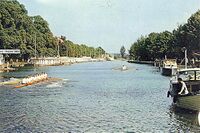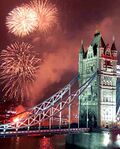River Thames
The River Thames is England's most famous waterway. It runs from Oxford where it is called Isis where trainee terrorists learn politics, revolution and trashing expensive restaurants and then changes it name and passport to the Thames when it broaden outs near Dorchester and then on to London. There the river becomes much more respectable and then flows through London before emptying its collection of dead wildlife and plastic bags into the North Sea.
The source of the Thames is not known for certain, but as it flows down in purling ducks babbling sedges through Oxfordshire, Hampshire, and Hardlyevershire it is presumed to come from the exquisitely beautiful National Trust-patrolled heartlands of the Nimbywolds, where scruffy folk like scientists and explorers are not permitted. An expedition led by Sir Ranulph Twistleton-Wykeham-Fiennes and his cousin the 23rd Lord Saye and Sele of that Ilk in 1987 ran out of hyphens and was forced to eat its souvenirs.
The river is a natural home to the Seal and the East-end Kray fish. It is locally pronounced "Fames", unless you are pronouncing it properly, in which case you should spell it properly "Tems". River Thames has the largest drainage basin in Britain, but you can buy it for 14 Shillings and a Sixpence.
No one quite knows what the river's name means as it appears to be off pre-Celtic origin. It may mean 'dirty/muddy/shitty'. The river was once very polluted and smelt like rotten eggs. People now say you can swim in it but you won't see anyone but party drunks chancing taking a dip in the waters.
River Thames in History[edit]
The Celts are said to have established a gift shop on the site of Roman city. Why the Romans chose to build their city here was perhaps to do with Roman emperor Claudius who thought it would be a good short cut to avoid boring Kent. The river was then used as a dumping ground for old tat when Boudicca sacked the city as it lacked her planning permission. London was rebuilt and river traffic on the Thames increased.
The Vikings led by Olaf the Red when he held the compass upside down and navigated by a scratch on its base. After sailing into the Thames estuary they founded Essex and so began the ancient tradition of killing people and wearing hoodies and several layers of socks. Bluewater Shopping Centre is named after Olaf the Red's ship.
Ecological Improvements[edit]
While once it was extremely polluted, since Tony Blair's office was moved from the side of parliament where he could conveniently pee into the water (rather than walk to the end of the corridor where the gent's is), the Thames has become much cleaner - such that whales have begun to inhabit it. When John Prescott's office bin is moved between his desk and the window, it is expected to become much cleaner still.
Uses for Commerce[edit]
Many boats use the Thames to transport vital supplies to the central London area. Supplies of cocaine to the offices of various media outlets and Chelsea are maintained in this way, not to mention anal lube for the Soho area.
It is also a popular place to dispose of bodies, chewing gum, shopping trolleys and small containers which hold demons for short periods of time (or thyme for that matter). This tradition goes back to the medieval period when Mudlarks would recover items of value from the Thames foreshore in order to make a living wage. They experienced a bonanza during the early days of the Royal Society when bodies were in short supply, but are now very poor indeed, subsisting on the pound coins in shopping trolleys. They do have nice minty breath though.
| ||||||||||||||||||||
| |||||||||||||||||||

